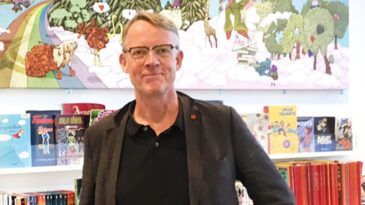Closed doors damage trust
28 nov 2022 • 5 min
SURVEY Limited transparency and poor communication. Biblioteksbladet’s survey shows that the turbulence is raising questions among IFLA members in Sweden.

The questions
1) Is IFLA a transparent organisation?
2) Do you have a good understanding of the cooperation between IFLA and the SIGL Foundation?
3) Do you have confidence in how IFLA is led?

Karin Grönvall
Head of the National Library of Sweden.
1) Due to its size and scope, we have to take into account that there are several levels and structures. I feel that the work on committees, and cooperation between the committees, is transparent. On the other hand, the Board has not been able to convey the sense of security, determination and transparency that the organisation’s members have needed and should have received during a turbulent time.
2) What has been clear is that the Chair stated publicly that SIGL was created in order to minimise the taxes paid on the funds that the Bill and Melinda Gates Foundation contributed. The connection to IFLA, the management etc., is not clear.
3) KB (the National Library of Sweden) remains an institutional member and believes in IFLA as an organisation. We believe that confidence in the organisation will recover with the help of members who believe that IFLA and the sector can organise themselves in a democratic and transparent way, and make demands on the management. For continued trust, management must be open to addressing any situations that arise and communicate openly with members.

Morgan Palmqvist
Senior Librarian, Gothenburg University Library.
1) The problems and discussions of the past year have shown that IFLA is not as transparent as expected. It is a member-driven organisation and must look after the best interests of its members, be transparent and inclusive. And, last but not least, it ought to create trust in the Board, which is elected by the members.
2) Very little transparency.
3) Well, there is a belief that the current Board wants to be more transparent and reliable, but they still have far to go.

Daniel Forsman
City Librarian, Stockholm.
1) It can be difficult to understand how IFLA works. Those who have been involved for a long time work in established structures where short cuts, roles and the ways of doing things have become the natural way of doing things. As with any organisation, it is difficult to free yourself from your own structure as needs evolve and the world around you evolves. In an international context, it is no wonder that there are differences of opinion about strategic or operational issues. Embracing these and finding structures to work with them is one of IFLA’s major challenges, and today
I feel that the organisation prioritises the appearance of unity, and thus transparency suffers.
2) IFLA’s current operations are financially dependent on SIGL. Because an independent foundation is financing activities carried out in an association, it is of course interesting for members to understand how the two are connected and how the strategic agenda has been set. Here, in my opinion, the organisations have not been transparent enough. This affects confidence and opens up unnecessary speculation.
3) It has been a stormy time for IFLA. I think that the Swedish Library Association has acted constructively, and set a good example, by motioning that IFLA needs to improve its communication in order to become more transparent. This motion was passed by a large majority and I now expect greater clarity on how IFLA should act in the future. Confidence in the management of IFLA has been affected and Stockholm Public Library is considering not renewing its membership. However, not having our own membership does not prevent us from being active within IFLA, as institutional members of the Swedish Library Association can work within IFLA.

Anna Troberg
Chair, DIK (trade union).
1) No, unfortunately not. The recent internal conflicts and their management have created an image of IFLA as a fairly closed and top-down organisation. It is important that as an organisation we put an end to this once and for all and are much more transparent, going forward.
2) The cooperation between IFLA and SIGL is an area that would benefit from much greater transparency. There is a lot that is unclear at the moment and of course this creates uncertainty among the member organisations, which damages trust in both IFLA and SIGL
3) ) It is clear that confidence in IFLA has been damaged by all the turbulence that has occurred. I hope the criticism is taken seriously and in the future they will actively work transparently to restore the trust they have lost. IFLA’s strength is entirely dependent on a strong member commitment. We cannot afford to lose the confidence of our members.

Karin Linder
Secretary General, Swedish Library Association.
1) Definitely not, it’s very difficult to understand IFLA’s finances, the relationship between the different levels of the organisation. Election to the Board takes place among groups of friends, cliches and non-transparency.
2) Zero transparency. It’s really bad that there is no insight into the relationship between the two associations.
3) I’ve always wondered about the management, especially due to all the empty words. We are IFLA — what is that?

Lars Burman
Senior Librarian, Uppsala University Library
1) Unfortunately, large organisations with complex structures often lack transparency. IFLA could do more to be perceived as transparent. Trust needs to be restored, especially after a large crisis, and this is best done through reforms and open communication.
2) I have not had reason to delve into the matter, but I know the construction. I cannot say that I feel there is transparency, but I have not tried to look closely either.
3) IFLA has a crisis behind it. If activities and management work develop as promised, much of the trust can be regained.

Torbjörn Nilsson
City Librarian, Malmö.
1) No, not at the moment, not even for its members. The Chair/Governing Board determines the degree of transparency.
2) I have not. It is a financial construction that benefits IFLA.
3) More transparency is needed to be able to answer that question. That’s why it’s a ’no’.

Maria Haglund
Chief Librarian, Royal Institute of Technology Library.
1) IFLA in general is perceived by many as administratively heavy and quite difficult to navigate.
2) Have not looked into the collaboration.
3) The new management has an important mission in creating trust in the organisation, and showing how they want to work with development through transparent leadership. The seminar at the IFLA conference in Dublin this summer, Out in the Open: Recent Governance Developments at IFLA, was a good first step, but more action will be needed.
Senaste nytt

Prisad gerillaläsning ska locka till böckerna
I Katrineholm har biblioteket dragit ner på digital service och satsar i stället stort på läsfrämjande. Nyligen prisades de för sina insatser och på Världsbokdagen gav sig personalen åter ut på gerillaläsning.
24 apr 2024 • 3 min
Bibliotek oförberedda på lag om tillgänglighet
Nästa sommar träder en ny lag om tillgängliga medier i kraft. Myndigheten för tillgängliga medier informerar just nu bibliotekspersonal, men bilden är ännu oklar. "Vi vet inte riktigt hur bibliotek och läsare kommer påverkas."
23 apr 2024 • 2 min

SKR-kritik mot regeringen: ”I luftslott läses inga böcker”
Regeringens anslår 430 miljoner per år för att alla skolor ska kunna ha bemannade skolbibliotek. Men kostnaderna är underskattade, enligt företrädare för SKR som hävdar att den verkliga kostnaden blir 2,1 miljarder.
22 apr 2024 • < 1 min

Dags att prata läsfrämjande för universitetsstudenter
Den bristande läsförmågan hos barn har varit högt på agendan och politiker talar om läskris. Nu är det dags att ta upp läsningen även bland universitetsstudenter och i november arrangerar Malmö universitetsbibliotek en konferens på temat.
22 apr 2024 • 2 min

På nätets skuggsida är vetenskapen öppen på riktigt
Alltmer vetenskap är fritt tillgänglig. Det beror inte bara på utvecklingen mot öppen tillgång, utan också på olagliga skuggbibliotek som erbjuder gratis vetenskap. Drivkraften är att sprida det man anser tillhör allmänheten.
18 apr 2024 • 4 min

Stabil ekonomi med förlust – men nu kapas kostnaderna
Oroliga tider – men Svensk biblioteksförenings ekonomi är ändå stabil, visar årsredovisningen för 2023. ”Nu ser vi över kostnaderna brett”, säger ordförande Helene Öberg.
17 apr 2024 • < 1 min

Nya namn föreslås till styrelsen
När ny styrelse ska väljas i Svensk biblioteksförening står två nya namn på valberedningens lista. Och ordförande Helene Öberg föreslås väljas om för ytterligare en tvåårsperiod.
17 apr 2024 • 2 min
Oro för bristande engagemang i föreningen
Endast två motioner har lämnats in inför Svensk biblioteksförenings årsmöte. Något som skulle kunna tyda på ett svagt engagemang. Dessutom handlar motionerna om, ja precis, bristande engagemang i föreningen.
16 apr 2024 • 2 min

”Folkbiblioteken är kärnan i delningsekonomin”
Vilken roll kan folkbiblioteken spela i delningsekonomin? Väldigt stor, svarar forskare som i studien Upscale följt danska och norska bibliotek strävan för ökad hållbarhet.
15 apr 2024 • 4 min

Inträdet i Nato får deras uppdrag att växa
Sveriges medlemskap i Nato innebär mycket nytt för Sjöstridsskolans bibliotek där två av Försvarsmaktens tre bibliotekarier jobbar. Ny information ska hanteras, nya arbetsuppgifter väntar, ny kompetens behövs.
12 apr 2024 • 3 min

Edholm om skolbiblioteken: "Man måste börja nånstans"
Det är upp till lärosätena att åtgärda bristen på skolbibliotekarier. Det är ett besked från skolminister Lotta Edholm när hon besöker Bibliotekshögskolan i Borås. "Det är klart att unga människor får upp ögonen för yrket. Och när söktrycket ökar är det naturligt att utöka antalet platser."
11 apr 2024 • 5 min

Kulturen viktig för hälsan – men bibliotekens roll oklar
Kulturens betydelse för hälsan har bekräftats i många studier. Men effekten av läsande och skrivande är mindre beforskat. Och forskning om bibliotekens betydelse för folkhälsan saknas.
10 apr 2024 • 2 min







0 kommentarer